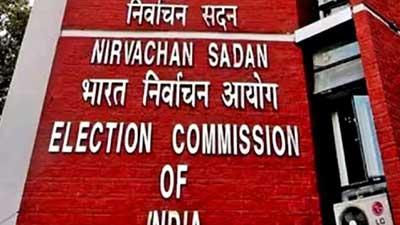Date : 13/12/2023
Relevance: GS Paper 2 – Polity
Keywords: ECI, Supreme Court, Impartiality, Electoral Reform
Context-
In recent times, a proposed bill aimed at reforming the process of appointing members to the Election Commission of India (ECI) has sparked heated debates and drawn criticism from various quarters. While the intent behind electoral reforms is often noble, concerns have been raised regarding the potential consequences of the proposed changes. This article delves into the key criticisms and concerns surrounding the bill, highlighting the importance of safeguarding the independence and integrity of the ECI.
About Election Commission of India
- The Election Commission of India (ECI) functions as an autonomous constitutional authority with the mandate of overseeing Union and State election processes in India.
- Established in accordance with the Constitution, the ECI came into existence on January 25, 1950, a date celebrated annually as national voters' day.
- The commission's secretariat is located in New Delhi, serving as the central hub for its administrative functions.
- The ECI plays a pivotal role in conducting elections for key institutions in the country, including the Lok Sabha, Rajya Sabha, and State Legislative Assemblies.
- Additionally, the ECI is responsible for overseeing elections for the offices of the President and Vice President of India.
- Notably, the ECI's jurisdiction does not extend to elections for panchayats and municipalities in the states. The Constitution of India designates a separate State Election Commission to manage these local-level elections.
What is the Contentious Bill:
The government, responding to the Supreme Court's directive, introduced a Bill in August 2023. While seemingly intended to comply with the order, the Bill sparked controversy due to two key proposals:
- Replacing the CJI in the selection committee with a Cabinet Minister: This move was seen as an attempt to grant the government significant influence over the selection process, potentially creating concerns about political interference.
- Downgrading the status of the CEC and ECs: The proposal to equate their status with the Cabinet Secretary, while maintaining similar salaries, raised concerns about the erosion of their perceived authority and independence. This could impact their ability to summon senior officials and Ministers, hindering their investigative and enforcement powers.
Criticism and Concerns:
The Bill faced strong criticism from various quarters, including opposition parties, retired ECI officials, and civil society groups. They raised concerns about the following:
A. Undermining the ECI's independence:
- One of the primary points of contention centers around the composition of the selection committee responsible for appointing ECI members. Critics argue that replacing the Chief Justice of India (CJI) with a Cabinet Minister in this committee undermines the ECI's independence. The CJI's presence has traditionally been viewed as a crucial safeguard against political interference, ensuring a balanced and impartial selection process. However, the proposed change could grant the government undue influence, potentially compromising the ECI's ability to function independently.
- The inclusion of a Cabinet Minister in the selection committee raises concerns about the appointment process being swayed by political motivations rather than a commitment to upholding the democratic principles that the ECI is entrusted to protect. Without a representative from the judiciary, there is a risk that the appointment of ECI members may become a tool for political maneuvering, eroding the institution's credibility in the eyes of the public.
B. Downgrading the status of the ECI:
- Another significant point of contention revolves around the proposed downgrading of the ECI's status. Currently, members of the ECI are appointed from among retired Supreme Court judges, contributing to the institution's symbolic representation of impartiality and authority. Critics argue that any move to diminish this status could have far-reaching implications for the public's trust in the electoral process.
- The elevation of the ECI members to the status of Supreme Court judges serves as a testament to the institution's importance and reinforces the perception of its autonomy. Reducing this status could result in a decline in public confidence, making it challenging for the ECI to effectively exercise its powers. It is essential to recognize the symbolic value of the ECI's status in upholding democratic values and maintaining a strong, independent electoral body.






















